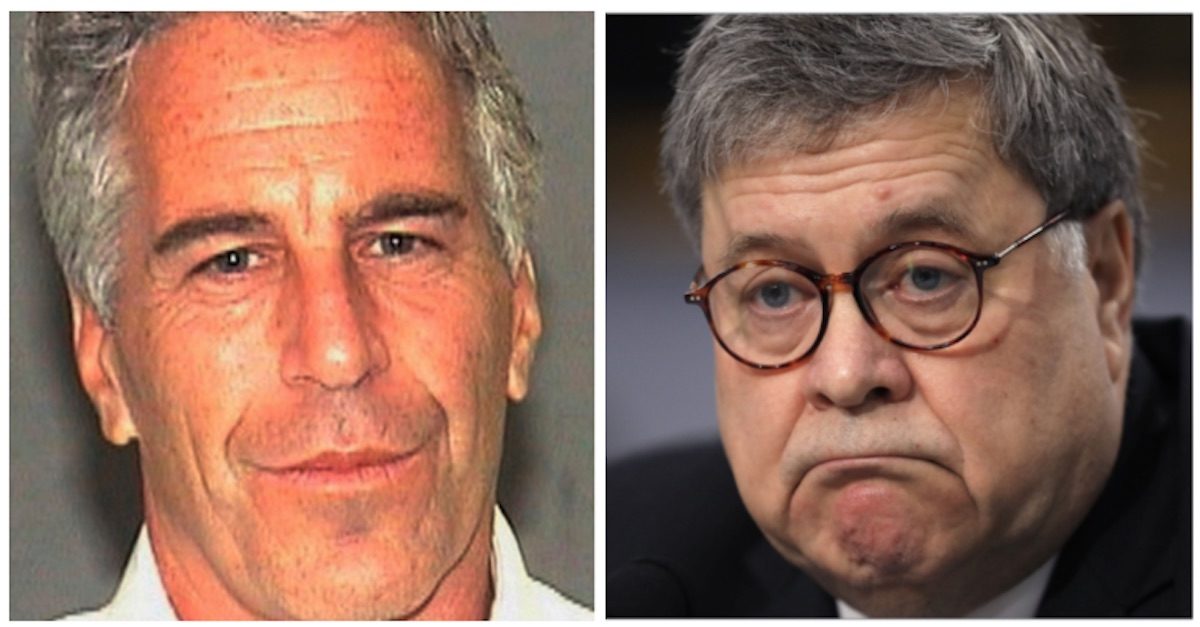
After he was told that accused child sex-trafficker and convicted sex offender Jeffrey Epstein died by suicide in the Metropolitan Correctional Center in New York City, U.S. Attorney General William Barr was immediately aware of the intense backlash that would head his way. Epstein, one of the nation’s most high-profile prisoners–while housed in a federal facility–was taken off of suicide watch before his death, despite a reported unsuccessful suicide attempt in the weeks prior.
According to the New York Times, Barr was at home when he received news of Epstein’s death early that Saturday morning; he “immediately knew” that his name would be attached to a new–and unexpected–scandal. Barr reportedly inserted himself directly into the matter and made a number of unconventional decisions in an attempt to subdue the impending scandal and prevent any conspiracy theories from taking root. What’s more, the Times headline suggested, Barr’s furious response may have had something to do with mounting doubts about the Trump Administration’s DOJ.
After spending the remainder of Saturday morning furiously questioning his deputies, Barr reportedly ordered the FBI investigation into Epstein’s death, as well as an Inspector General inquiry directed at identifying any protocol failures that may have allowed Epstein to take his own life.
After the federal Bureau of Prisons released confirmation of Epstein’s death, Barr reportedly surprised many officials by not allowing the Bureau to control the narrative. Instead, Barr released his own statement regarding the situation.
“I was appalled to learn that Jeffrey Epstein was found dead early this morning from an apparent suicide while in federal custody. Mr. Epstein’s death raises serious questions that must be answered. In addition to the FBI’s investigation, I have consulted with the Inspector General who is opening an investigation into the circumstances of Mr. Epstein’s death,” he said.
As more information about the circumstances of Epstein’s suicide emerged, Barr remained hands-on in the response process. He quickly placed two prison officials on leave after learning they had broken protocol by not checking on Epstein every 30 minutes the night of his death, and immediately removed MCC warden Lamine N’Diaye from that post.
Barr continued to comment on Epstein investigation in the intervening days, telling reporters that there were “serious irregularities” at MCC the following Monday.
“I was appalled, and indeed the whole department was, and frankly angry to learn of the MCC’s failure to adequately secure this prisoner,” Barr said at a New Orleans police conference two days after Epstein’s death. “We are now learning of serious irregularities at this facility that are deeply concerning and demand a thorough investigation. The FBI and the office of inspector general are doing just that.”
“We will get to the bottom of what happened and there will be accountability,” he promised.
Barr took things a step further, announcing that he was removing the acting director of the Bureau of Prisons (BOP) Hugh Hurwitz from that role. Barr announced he was replacing Hurwitz with Dr. Kathleen Hawk Sawyer, who served as BOP Director from 1992 to 2003. She was the first woman to lead the BOP. Barr also announced that Dr. Thomas R. Kane is the choice for Deputy Director of the BOP.
It was reported Thursday that “as many as 20″ corrections officers have received subpoenas.
[image via Palm Beach Sheriff’s Office, Chip Somodevilla/Getty Images]